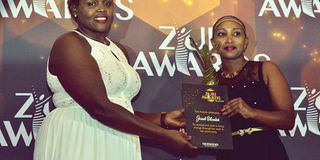Premium
Africa must support women in tech

Agnes Limo (left) of Women in Technology Lead Safaricom presents an award to Janet Silantoi of Butterfly Techies after she won in the Science Technology Engineering and Mathematics (STEM) category on March 7, 2019 during the Zuri Awards held at the Villa Rosa Kempinski.
What you need to know:
- Studies have shown that the world would be a lot richer if women got a chance to display their full potential in the work force.
- Women need to be educated, mentored and to independently develop networks for them to succeed.
- A number of women in Africa have set out to use technology to mentor the continent’s women.
- These private sector initiatives require policy support, as this would demonstrate that Africa recognises the potential in its women.
Hillary Clinton once said that women are the largest untapped reservoir of talent in the world. This reservoir can be tapped if we address issues of mentorship and equality.
Studies, notably by the McKinsey Global Institute (MGI), have established that $12 trillion could be added to global GDP by 2025 simply by advancing women’s equality. In an article, How advancing women’s equality can add $12 trillion to global growth, MGI argues that, if this is to happen, the public, private, and social sectors will need to act to close gender gaps in work and society.
And that is not all. The report further argues that:
In a “full potential” scenario in which women play an identical role in labor markets to that of men, as much as $28 trillion, or 26 per cent, could be added to global annual GDP by 2025. Full-potential estimate, according to MGI, is about double the average estimate of other recent studies, reflecting the fact that MGI has taken a more comprehensive view of gender inequality in work.
The potential for women playing a key role in the economy is however not exploited. Women need to be educated, mentored and to independently develop networks for them to succeed.
Some organisations such as the African Women in Technology (AWIT) are leveraging technology to provide access to mentoring, networking and learning. The existence of stereotypes in society, especially in Africa, is so strong that dealing with it effectively, there is no other option but to provide opportunities and a safe space to develop and grow women leaders in both tech and society.
The scenarios are changing, albeit slowly. Locally, a young entrepreneur, Topyster Muga, founded the myProsper.app startup, an App that will assist young professionals to succeed in their endeavors. With experienced, highly accomplished professionals offering personalised, trustworthy affordable advice on demand online and over the phone, the startup provides career and business mentorship on a freelance basis, taking advantage of the digital world that enables meetings in a variety of platforms.
myProsper.app recognise that while most people desire a thriving social life, a healthy and fit body, emotional intelligence and of course a better financial status, they are often at a loss on how to follow through. The focus of this start up is to provide the bridge between one’s desires and the outcome in life.
They deal with critical developmental skills such as personal productivity, resilience and finances. Younger mentees are taken through life experiences, and their digital presence (understanding the online content within their control, such as own website and social media profiles, and other content not within their control, such as online reviews) is appreciated, particularly how it can impact their lives.
Self-improvement programme
The application’s dynamic programmes draw on global best practices to design a personalised tech-savvy self-improvement programme that helps the youth grow into their best. They are also exploring Artificial Intelligence for adaptive learning so as to leave no one behind.
These private sector initiatives require policy support, as this would demonstrate that Africa recognises the potential in its women. The African continent is replete with women agenda, frameworks and policies but it’s all talk. Only a handful of countries that have seriously implemented policies on women equality have natured the talent that delivered outstanding outcomes such as that of the founder of this new platform.
This is happening in spite of the fact that African Heads of State like to peddle the hopes of Agenda 2063 “the Africa we want” adopted in 2015, as a framework to drive the Continent’s transformation. In the Agenda, the promise of “a prosperous Africa based on inclusive growth and sustainable development,” with well-educated citizenry is well articulated.
Education is a key cog in the attainment of equality. African governments in 2016 adopted the Continental Education Strategy for Africa 2016-2025 as the framework for transforming education and training in the continent in line with the Global Sustainable Development Goal 4 (SDG4) of the 2030 Sustainable Development Agenda.
While there are many frameworks and policies at continental level on equality, especially on access to education, the number of children out of school is staggering. Unesco’s Institute for Statistics (UIS) published a report, 263 Million Children and Youth Are Out of School, in 2016, which stated that more than a quarter a billion children and youth (majority girls) were out of school and that the majority of them were in sub-Saharan Africa.
In countries like Zambia where policies have worked, it was because of intense advocacy on “promoting girls’ education as a human right” by the Forum for African Women Educationalists (FAWE). As a result, “the government rolled out the re-entry policy for teenage mothers in 1997. It required all schools to grant girls maternity leave and readmit them to facilitate their education.”
Tanzanian President John Magufuli issued edicts to ban pregnant students and entrenched his comments into official government policy. The President further castigated nongovernmental organisations that have been advocating allowing teen mothers back in school. He accused advocacy groups as “being used by foreign agents.”
Such retrogressive policy pronouncements that contradict continental aspirations call for the support of women organisations involved in educating and empowering women.





